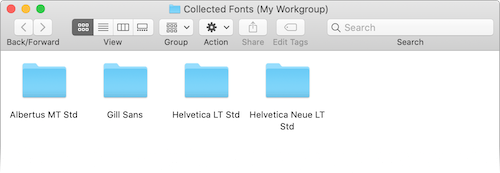Dieser Artikel ist nicht in Deutsch verfügbar. Durch Aufrufen dieses Artikels unterstützen Sie uns, dessen Übersetzung zukünftig in Betracht zu ziehen.
Falls Sie zusätzliche Unterstützung oder für den Kundendienst relevante Fragen haben, wenden Sie sich bitte an unser deutsches Kundendienst-Team über dieses Formular: https://help.extensis.com/hc/de/requests/new
To collect fonts from Universal Type Server, you must log in to Universal Type Client as a full administrator or as a user with the Collect Fonts for Output permission for each workgroup.
- You can’t collect fonts from the Adobe Fonts section
- Users must collect the fonts out of any personal workgroups they have
- If you have PostScript Type 1 fonts, you must use Universal Type Client for the Mac to collect Mac-formatted Type 1 fonts and Universal Type Client for Windows to collect Windows-formatted Type 1 fonts
Exporting the fonts from a workgroup
Note: My Fonts isn’t a workgroup; it’s a view that displays the fonts in every workgroup you belong to. You should collect fonts from each workgroup individually.

- Open UTC
- Select your workgroup from the workgroups pane
- Click a font in the fonts pane, then choose Edit > Select All
- Choose File > Collect Fonts for Output; UTC will ask you to select a location for the collected fonts
- Select your desktop and click Collect
UTC creates a Collected Fonts folder and places copies of your fonts inside, sorted by font family. Rename the folder “Collected Fonts (<workgroup name>)”.

If you need to collect fonts from more than one workgroup (including personal workgroups), repeat these steps for each workgroup.
Exporting sets from a workgroup
- Open UTC
- Select your workgroup from the workgroups pane
- Select one or more font sets in the workgroup
- Drag the sets to the Desktop
UTC creates a new Collected Fonts folder and places copies of your fonts in a subfolder for each set, sorted by font family. (If a Collected Fonts folder already exists, UTC will add the sets to the existing folder.) Rename the folder “Collected Sets (<workgroup name>)”.

If you need to collect sets from more than one workgroup (including personal workgroups), repeat these steps for each workgroup.